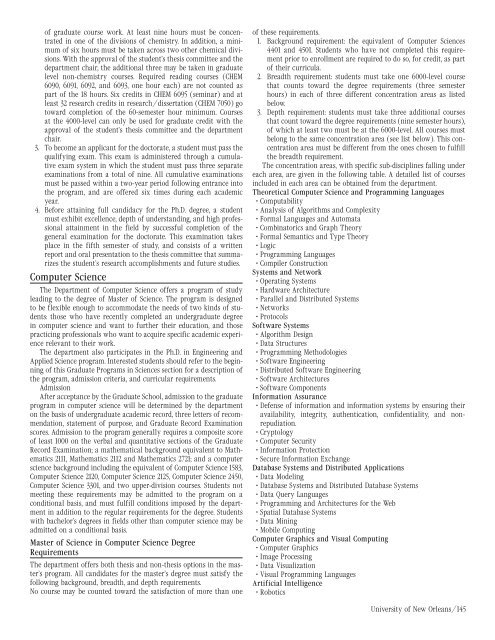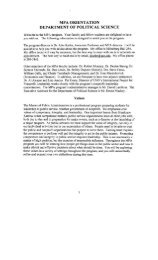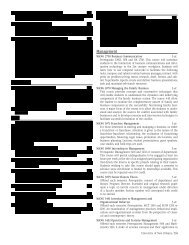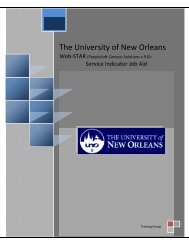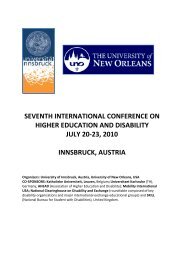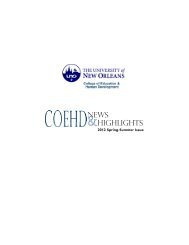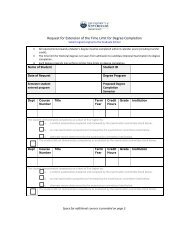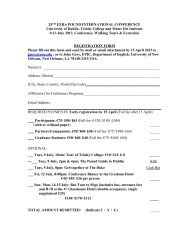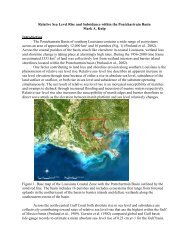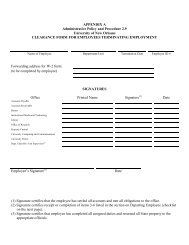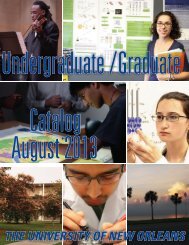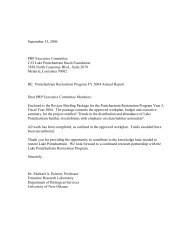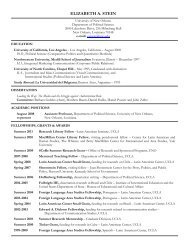Untitled - University of New Orleans
Untitled - University of New Orleans
Untitled - University of New Orleans
Create successful ePaper yourself
Turn your PDF publications into a flip-book with our unique Google optimized e-Paper software.
<strong>of</strong> graduate course work. At least nine hours must be concentrated<br />
in one <strong>of</strong> the divisions <strong>of</strong> chemistry. In addition, a minimum<br />
<strong>of</strong> six hours must be taken across two other chemical divisions.<br />
With the approval <strong>of</strong> the student’s thesis committee and the<br />
department chair, the additional three may be taken in graduate<br />
level non-chemistry courses. Required reading courses (CHEM<br />
6090, 6091, 6092, and 6093, one hour each) are not counted as<br />
part <strong>of</strong> the 18 hours. Six credits in CHEM 6095 (seminar) and at<br />
least 32 research credits in research/dissertation (CHEM 7050) go<br />
toward completion <strong>of</strong> the 60-semester hour minimum. Courses<br />
at the 4000-level can only be used for graduate credit with the<br />
approval <strong>of</strong> the student’s thesis committee and the department<br />
chair.<br />
3. To become an applicant for the doctorate, a student must pass the<br />
qualifying exam. This exam is administered through a cumulative<br />
exam system in which the student must pass three separate<br />
examinations from a total <strong>of</strong> nine. All cumulative examinations<br />
must be passed within a two-year period following entrance into<br />
the program, and are <strong>of</strong>fered six times during each academic<br />
year.<br />
4. Before attaining full candidacy for the Ph.D. degree, a student<br />
must exhibit excellence, depth <strong>of</strong> understanding, and high pr<strong>of</strong>essional<br />
attainment in the field by successful completion <strong>of</strong> the<br />
general examination for the doctorate. This examination takes<br />
place in the fifth semester <strong>of</strong> study, and consists <strong>of</strong> a written<br />
report and oral presentation to the thesis committee that summarizes<br />
the student’s research accomplishments and future studies.<br />
Computer Science<br />
The Department <strong>of</strong> Computer Science <strong>of</strong>fers a program <strong>of</strong> study<br />
leading to the degree <strong>of</strong> Master <strong>of</strong> Science. The program is designed<br />
to be flexible enough to accommodate the needs <strong>of</strong> two kinds <strong>of</strong> students:<br />
those who have recently completed an undergraduate degree<br />
in computer science and want to further their education, and those<br />
practicing pr<strong>of</strong>essionals who want to acquire specific academic experience<br />
relevant to their work.<br />
The department also participates in the Ph.D. in Engineering and<br />
Applied Science program. Interested students should refer to the beginning<br />
<strong>of</strong> this Graduate Programs in Sciences section for a description <strong>of</strong><br />
the program, admission criteria, and curricular requirements.<br />
Admission<br />
After acceptance by the Graduate School, admission to the graduate<br />
program in computer science will be determined by the department<br />
on the basis <strong>of</strong> undergraduate academic record, three letters <strong>of</strong> recommendation,<br />
statement <strong>of</strong> purpose, and Graduate Record Examination<br />
scores. Admission to the program generally requires a composite score<br />
<strong>of</strong> least 1000 on the verbal and quantitative sections <strong>of</strong> the Graduate<br />
Record Examination; a mathematical background equivalent to Mathematics<br />
2111, Mathematics 2112 and Mathematics 2721; and a computer<br />
science background including the equivalent <strong>of</strong> Computer Science 1583,<br />
Computer Science 2120, Computer Science 2125, Computer Science 2450,<br />
Computer Science 3301, and two upper-division courses. Students not<br />
meeting these requirements may be admitted to the program on a<br />
conditional basis, and must fulfill conditions imposed by the department<br />
in addition to the regular requirements for the degree. Students<br />
with bachelor’s degrees in fields other than computer science may be<br />
admitted on a conditional basis.<br />
Master <strong>of</strong> Science in Computer Science Degree<br />
Requirements<br />
The department <strong>of</strong>fers both thesis and non-thesis options in the master’s<br />
program. All candidates for the master’s degree must satisfy the<br />
following background, breadth, and depth requirements.<br />
No course may be counted toward the satisfaction <strong>of</strong> more than one<br />
<strong>of</strong> these requirements.<br />
1. Background requirement: the equivalent <strong>of</strong> Computer Sciences<br />
4401 and 4501. Students who have not completed this requirement<br />
prior to enrollment are required to do so, for credit, as part<br />
<strong>of</strong> their curricula.<br />
2. Breadth requirement: students must take one 6000-level course<br />
that counts toward the degree requirements (three semester<br />
hours) in each <strong>of</strong> three different concentration areas as listed<br />
below.<br />
3. Depth requirement: students must take three additional courses<br />
that count toward the degree requirements (nine semester hours),<br />
<strong>of</strong> which at least two must be at the 6000-level. All courses must<br />
belong to the same concentration area (see list below). This concentration<br />
area must be different from the ones chosen to fulfill<br />
the breadth requirement.<br />
The concentration areas, with specific sub-disciplines falling under<br />
each area, are given in the following table. A detailed list <strong>of</strong> courses<br />
included in each area can be obtained from the department.<br />
Theoretical Computer Science and Programming Languages<br />
• Computability<br />
• Analysis <strong>of</strong> Algorithms and Complexity<br />
• Formal Languages and Automata<br />
• Combinatorics and Graph Theory<br />
• Formal Semantics and Type Theory<br />
• Logic<br />
• Programming Languages<br />
• Compiler Construction<br />
Systems and Network<br />
• Operating Systems<br />
• Hardware Architecture<br />
• Parallel and Distributed Systems<br />
• Networks<br />
• Protocols<br />
S<strong>of</strong>tware Systems<br />
• Algorithm Design<br />
• Data Structures<br />
• Programming Methodologies<br />
• S<strong>of</strong>tware Engineering<br />
• Distributed S<strong>of</strong>tware Engineering<br />
• S<strong>of</strong>tware Architectures<br />
• S<strong>of</strong>tware Components<br />
Information Assurance<br />
• Defense <strong>of</strong> information and information systems by ensuring their<br />
availability, integrity, authentication, confidentiality, and nonrepudiation.<br />
• Cryptology<br />
• Computer Security<br />
• Information Protection<br />
• Secure Information Exchange<br />
Database Systems and Distributed Applications<br />
• Data Modeling<br />
• Database Systems and Distributed Database Systems<br />
• Data Query Languages<br />
• Programming and Architectures for the Web<br />
• Spatial Database Systems<br />
• Data Mining<br />
• Mobile Computing<br />
Computer Graphics and Visual Computing<br />
• Computer Graphics<br />
• Image Processing<br />
• Data Visualization<br />
• Visual Programming Languages<br />
Artificial Intelligence<br />
• Robotics<br />
<strong>University</strong> <strong>of</strong> <strong>New</strong> <strong>Orleans</strong>/145


